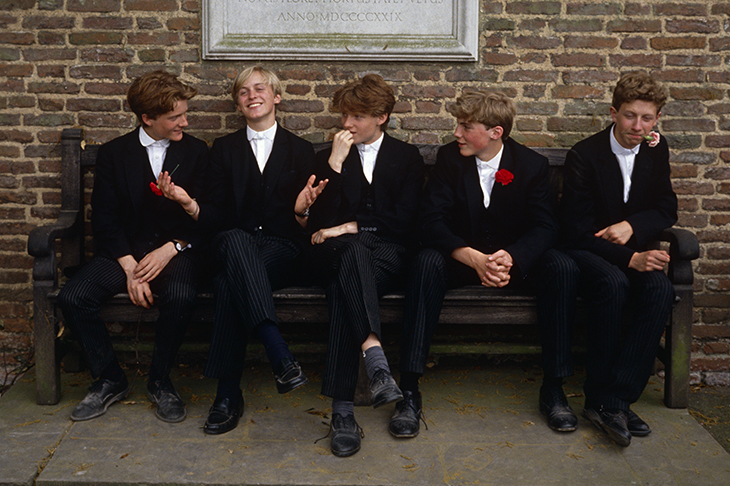Every prime minister is a sociologist. Theresa May drew a distinction between citizens of somewhere and ‘citizens of nowhere’, a sort of riff on David Goodhart’s distinction between Somewheres (rooted, provincial, less well off) and Anywheres (snooty, international, at home on planes and in the corridors of power).
Now Boris Johnson segments the country in a fresh way. He talks about the existence of both rural and ‘oppidan’ Britons feeling ‘under-invested, excluded’ and that ‘their lives and their futures weren’t as important’, and he implicitly opposes them to the elites.
Why oppidan? Oppidan is essentially a posh word for ‘townie’ (from the Latin oppidum). It has a special meaning to almost nobody except those who, like Boris Johnson himself, are alumni of Eton College. Its chief value as an analytical tool may therefore be in analysing Boris rather than in analysing the country.
At Eton, an Oppidan is anyone at the school who isn’t a scholar. The school was originally founded by Henry VI to educate 70 ‘poor scholars’, and the heart of the school was ‘College’, which is where those poor scholars were boarded, fed and educated. But then as now, the sharp-elbowed middle classes saw a good thing and wanted in on the act.
So over the years the custom emerged that some outsiders would be allowed to sit in on the lessons. And as this became a thing, so in due course these freeloaders ended up needing somewhere to stay. They couldn’t stay in College, so various entrepreneurial Mrs Miggins types put them up in boarding houses in the town. Fast forward a few hundred years and the place had been, so to speak, swamped with the buggers. Those boarding houses are now formally part of the school, and the scholars are outnumbered by about 25 to one.
Who looks down on whom? Here it gets a little complicated. To be a King’s Scholar or KS — as was Boris; as, full disclosure, was I — is to be an elite within an elite. Scholars continue to be housed separately from their Oppidan cousins, in what I have always thought of as the academic equivalent of a prison nonce wing. They are traditionally known as ‘tugs’. This is a bastardisation of gens togata, meaning people in gowns, because they wear gowns as part of their uniform. Hearty sorts of Oppidan who don’t know Latin tend to take the word tug as an invitation to do so.
Scholars look down on Oppidans intellectually. They might as well, because Oppidans look down on them socially. The school has always run various schemes to get bright children from more deprived backgrounds on scholarships. Oppidans have to have stinking rich parents, and in Boris’s day they didn’t have to be especially clever either, though being aristocratic would have helped. Caricaturally, scholars are weedy, common and clever. Oppidans are beefy and posh and dim.
Of the two prefect bodies, Pop (short for ‘popular’) tends to be stuffed with Oppidans, and Sixth Form Select (short for ‘unpopular’) tends to be stuffed with scholars. You can well imagine which one commands the adoration and respect of the younger children. You can also well imagine which of the two spends more of its golden years dancing Highland reels and snogging drunk girls in taffeta.
It should be noted that the Captain of School, Eton’s prime minister, is always a KS and he’s always in Pop, and is therefore a great unifier and not to be trusted near drunk girls in taffeta.
Got something to add? Join the discussion and comment below.
Get 10 issues for just $10
Subscribe to The Spectator Australia today for the next 10 magazine issues, plus full online access, for just $10.
You might disagree with half of it, but you’ll enjoy reading all of it. Try your first month for free, then just $2 a week for the remainder of your first year.















Comments
Don't miss out
Join the conversation with other Spectator Australia readers. Subscribe to leave a comment.
SUBSCRIBEAlready a subscriber? Log in